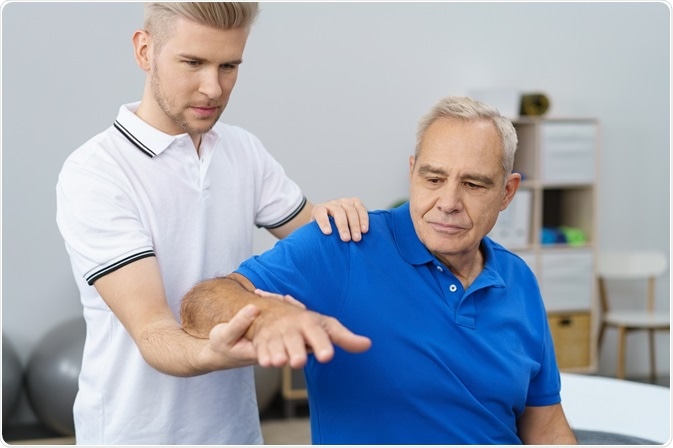Multiple sclerosis (MS) is a chronic inflammatory disease of the central nervous system (CNS) characterized by demyelination and degeneration of the neurons.
 Credit: stockfour/Shutterstock.com
Credit: stockfour/Shutterstock.com
MS affects approximately 1 - 2.5 million people worldwide. It is common in young adults, and often results in non-traumatic disability. Loss of mobility greatly impacts employment and other day-to-day activities. Exercise and physiotherapy play a positive role in the rehabilitation of patients with MS.
Benefits of exercise in patients with MS
Exercise has a range of benefits in patients with MS, and they are:
- Improved mood
- Enhanced strength and mobility
- Boosted self-esteem/self-confidence
- Lowered overall fatigue
- Reduced weight gain
- Enhanced function of bowel and bladder
Initially, people with MS feel tired when they start exercising, however, slowly they get accustomed to it.
Setting up exercise goals
Patients with MS are advised to consult the healthcare provider, and develop an exercise program according to their health condition. Healthcare provider can help achieve the patient’s goal by monitoring their progress. Consulting a physical therapist can help identify specific exercises based on the patient's need. The patient can keep track of their own progress by noting down the regular exercises.
Success of home-based program depends on whether or not it is enjoyable, varied, goal-oriented, and realistic. Home-based physical therapy programs have certain compliance issues including exhaustion, poor motivation, depression, lack of support from close family members and friends, time limitations, and cognitive dysfunction.
Types of exercises
Exercise programs of the patients include several types of exercises such as stretching, aerobic exercise, and strength-training.
Stretching
Stretching enhances the flexibility of muscles which help in performing day-to-day activities, and it also prevents injuries.
- Spend 10 minutes daily for stretching.
- Before stretching, a person should do warm-up for 5 to 10 minutes to prevent injuries.
- Stretch gently. The duration of each stretch should be 30-60 seconds. It is important to stretch the major muscle groups in the body.
Aerobic activity
Walking, swimming, cycling, and water aerobics are some of the common aerobic activities for an individual with MS.
- A minimum duration of 150 minutes of moderate-intensity workout per week is recommended by the experts.
- It is advisable to increase the aerobic activity slowly. Initial days of workout should be for shorter durations, and the duration of workout should be increased gradually.
- Several 10-minute periods can be used for working out in a day when the person has time constraints.
Strength training
Strength training is a crucial part of exercise regimen as it helps strengthen the muscles.
- Strength training exercises are recommended at least twice a week.
- Varieties of strength training exercises should be included in the regimen as it helps improve major muscle groups present in the body.
- Core strength exercises should be followed as they help strengthen the muscles of stomach, back, and, the surroundings of pelvis.
Important checkpoints to avoid problems
The following checklist can help the individual with MS in preventing problems associated with home-based exercise regimen.
- Avoid doing excess workout initially, instead start slowly.
- Proper hydration is required before, during, and after the exercise.
- The person with MS should stay cool while exercising. Fan or other cooling devices can be used during the workout sessions.
- Avoid exercising when MS symptoms are exacerbated. It is recommended to take rest and save the energy during these periods.
- Suitable footwear should be used during the exercise.
Further Reading
Last Updated: Oct 11, 2022